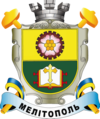Melitopol
|
Melitopol Мелітополь |
|||
|---|---|---|---|

Bohdan Khmelnytskyi Avenue in Melitopol
|
|||
|
|||
 |
|||
| Coordinates: 46°50′N 35°22′E / 46.833°N 35.367°ECoordinates: 46°50′N 35°22′E / 46.833°N 35.367°E | |||
| Country | Ukraine | ||
| Oblast | Zaporizhia | ||
| Established | 1784 | ||
| Government | |||
| • Mayor | Sergiy Valter | ||
| Area | |||
| • Total | 51 km2 (20 sq mi) | ||
| Population (2013) | |||
| • Total | 156,984 | ||
| Postal Index | 72300 | ||
| Climate | Cfa | ||
| Website | http://www.mlt.gov.ua, http://www.invest-melitopol.org | ||
Melitopol (Ukrainian: Мелітополь, translit. Melitopol’, Russian: Мелитополь) is a city in Zaporizhia Oblast (region) of the southeastern Ukraine. It is situated on the Molochna River that flows through the eastern edge of the city and into the Molochnyi Liman, which eventually joins the Sea of Azov. Population: 156,984 (2013 est.).
Melitopol is incorporated as a city of oblast significance and is the second largest city in the oblast after Zaporizhia. It serves as the administrative center of Melitopol Raion, though it does not belong to the raion.
Geographically, the city is in the south-eastern Ukraine, at the crossing of two major European highways E58 Vienna - Uzhhorod - Kiev - Rostov-na-Donu and E105 Kirkenes - St. Petersburg - Moscow - Kiev - Yalta. The electrified railway line of international importance goes through Melitopol. 80% of passenger train lines go through toward their destination of Crimean cities. Melitopol is also called "the gateway to the Crimea", because in the summer time the road traffic in the city reaches 45,000 vehicles per day, heading for the coast of Sea of Azov and the Black Sea.
In medieval times, there was a small Noghai aul of Kyzyl-Yar where the modern Melitopol is settled. In July 1769, Russian military commanders built a redoubt there, and Zaporizhia Cossacks carried out their duty service there. On February 2, 1784, Ekaterina II issued the decree to create the Taurian Province on the lands that had been won. The deputy of Novorossiya His Highness Prince Potemkin signed the relation to establish a town that very year - and Cossacks' families and those of retired soldiers of Suvorov settled on the right bank of the Molochna River. Among others, Germans were encouraged to settle in the new province, and some villages in this area were for many years German-speaking, such as Heidelberg (now Pryshyb) some 50 kilometres (31 miles) to the north of Melitopol.
...
Wikipedia


